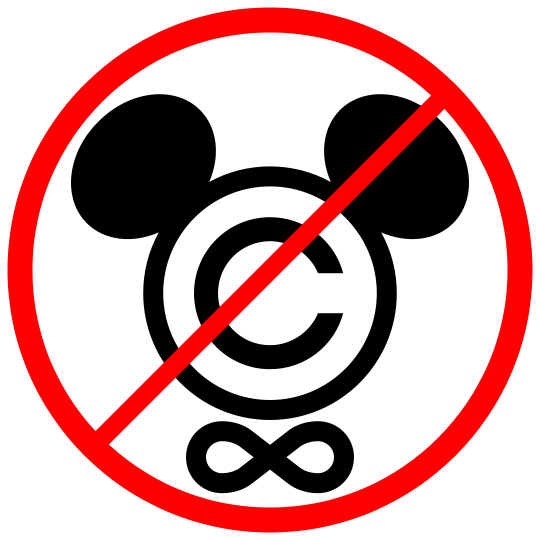How did Mickey Mouse change copyright?
This Friday night we want to tell you an entertaining story about Mickey Mouse and copyright. With this note, we begin the rubric, within the framework of which we will post short informative notes about copyright every Friday.
Mickey Mouse as a symbol of copyright.
The history of copyright law dates back more than 300 years. Over the course of three centuries, several acts have been adopted, which everyone has heard about one way or another: the fact of the existence of the Berne Convention and the DMCA is known to many. Today we want to talk about another law known to many, adopted in the USA in 1998. This refers to the Copyright Term Extension Act (popularly known as the Mickey Mouse Law).

Mickey Mouse was born in 1928. Officially, the birthday of the most famous cartoon character in the United States is considered November 18, 1928. It was on this day that the cartoon “Steamboat Willie” was shown to the world. The rights to Mickey Mouse belong to Disney, for which Mickey Mouse is one of the main assets: analysts estimate the cost of Mickey Mouse in the amount of more than $ 3 billion. In 2000, Walt Disney's monopoly on Mickey Mouse was due to end, and so the company began lobbying for a law to extend copyright terms.
Initially, lobbyists demanded an eternal monopoly. But it turned out that the infinite term of copyright is contrary to the American Constitution. Jack Valenti, chairman of the MPAA (Motion Picture Association of America), said that in this case, the copyright term should be forever minus one day.

After lengthy discussions, the Law went through the procedure and was adopted. By the way, one of the most active supporters of this bill was Sonny Bono: the first husband of singer Cher, once a musician, he did not live up to the adoption of the law and therefore the act was named in his honor - the Sonny Bono Copyright Term Extension Act.
Total
The adopted Law increased the term of copyright protection until the author’s life and 70 years after his death, and for employment - up to 120 years after creation or 95 years after publication, whichever is earlier.
In 1999, book publisher Eric Eldred and lawyer Lawrence Lessig tried to challenge the constitutionality of the Act based on the First Amendment to the US Constitution. The lawsuit moved slowly through the courts and in October 2002 ended up in the Supreme Court. On January 15, 2003, the US Supreme Court, with seven votes to two, rejected the lawsuit.
How about us?
In our country, a work passes into the public domain 70 years after the death of the author, as in the USA. In general, the picture in the world is approximately the following:

picture - Wikipedia
Here is such a story. Subscribe to our blog and next Friday you will learn how copyright and Hitler are related.
Mickey Mouse as a symbol of copyright.
The history of copyright law dates back more than 300 years. Over the course of three centuries, several acts have been adopted, which everyone has heard about one way or another: the fact of the existence of the Berne Convention and the DMCA is known to many. Today we want to talk about another law known to many, adopted in the USA in 1998. This refers to the Copyright Term Extension Act (popularly known as the Mickey Mouse Law).

Mickey Mouse was born in 1928. Officially, the birthday of the most famous cartoon character in the United States is considered November 18, 1928. It was on this day that the cartoon “Steamboat Willie” was shown to the world. The rights to Mickey Mouse belong to Disney, for which Mickey Mouse is one of the main assets: analysts estimate the cost of Mickey Mouse in the amount of more than $ 3 billion. In 2000, Walt Disney's monopoly on Mickey Mouse was due to end, and so the company began lobbying for a law to extend copyright terms.
Initially, lobbyists demanded an eternal monopoly. But it turned out that the infinite term of copyright is contrary to the American Constitution. Jack Valenti, chairman of the MPAA (Motion Picture Association of America), said that in this case, the copyright term should be forever minus one day.

After lengthy discussions, the Law went through the procedure and was adopted. By the way, one of the most active supporters of this bill was Sonny Bono: the first husband of singer Cher, once a musician, he did not live up to the adoption of the law and therefore the act was named in his honor - the Sonny Bono Copyright Term Extension Act.
Total
The adopted Law increased the term of copyright protection until the author’s life and 70 years after his death, and for employment - up to 120 years after creation or 95 years after publication, whichever is earlier.
In 1999, book publisher Eric Eldred and lawyer Lawrence Lessig tried to challenge the constitutionality of the Act based on the First Amendment to the US Constitution. The lawsuit moved slowly through the courts and in October 2002 ended up in the Supreme Court. On January 15, 2003, the US Supreme Court, with seven votes to two, rejected the lawsuit.
How about us?
In our country, a work passes into the public domain 70 years after the death of the author, as in the USA. In general, the picture in the world is approximately the following:

picture - Wikipedia
Here is such a story. Subscribe to our blog and next Friday you will learn how copyright and Hitler are related.
